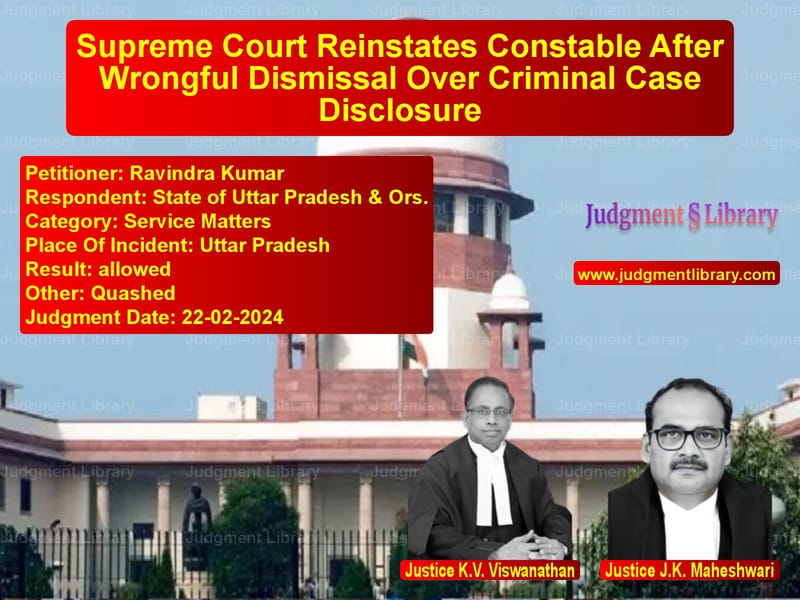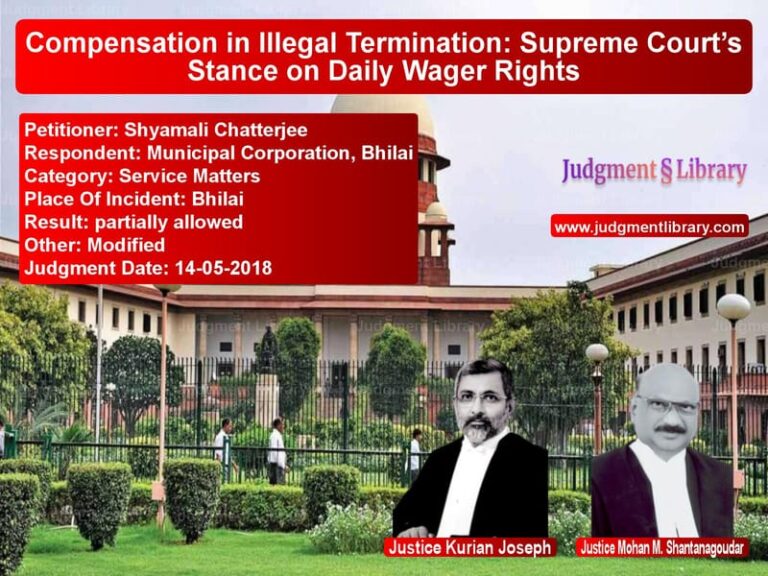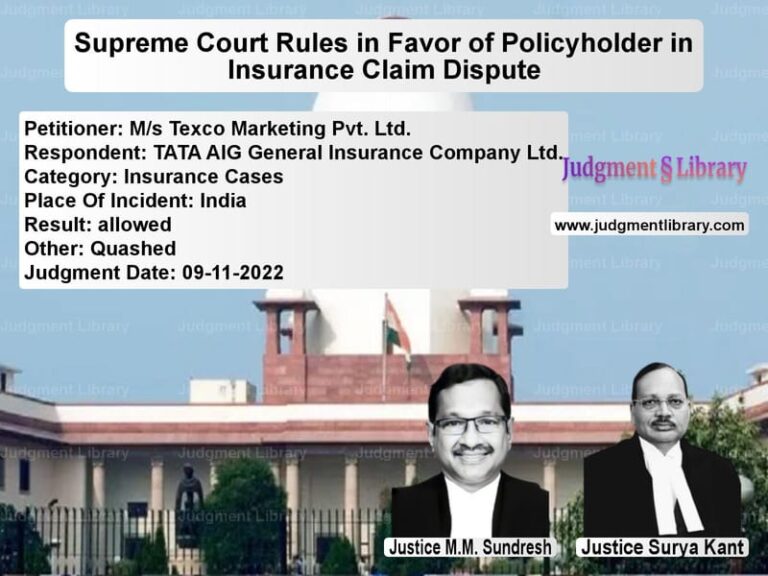Supreme Court Reinstates Constable After Wrongful Dismissal Over Criminal Case Disclosure
The Supreme Court of India has delivered a significant judgment in favor of Ravindra Kumar, a constable whose appointment was canceled due to non-disclosure of a past criminal case in his verification form. The ruling reaffirms that each case must be judged on its individual merits and that a blanket rule disqualifying candidates for non-disclosure of acquitted cases is unjust. This case has set a precedent for fair employment policies, especially in disciplined forces like the police.
Background of the Case
Ravindra Kumar applied for the post of Constable on February 12, 2004. Five days later, on February 17, 2004, he was implicated in a criminal case under Sections 324, 352, and 504 of the Indian Penal Code (IPC). However, by September 13, 2004, he was acquitted as the prosecution witnesses turned hostile. The informant and key witness in the case stated that they could not identify the accused, and a compromise was accepted by the court.
After clearing all stages of selection, Kumar was required to submit an affidavit disclosing any past criminal records. On October 30, 2004, he submitted an affidavit stating that no criminal case had ever been registered against him. Despite this, when he reported for training, he was informed that his character verification was pending. Subsequently, on April 12, 2005, his selection was canceled on the grounds that he had concealed information about the criminal case in his affidavit.
Legal Challenges and High Court Decision
Kumar challenged his dismissal before the Allahabad High Court, arguing that he had been acquitted and, therefore, did not believe he was required to disclose the case. However, the Single Judge dismissed his writ petition, ruling that suppression of facts regarding criminal cases warranted cancellation of selection. The Division Bench also upheld this view, asserting that even an acquitted individual must disclose past cases.
Arguments by the Petitioner (Ravindra Kumar)
- At the time of application, no criminal case was pending against him, as the case was filed five days later.
- He had been acquitted, and no appeal was filed against his acquittal, proving his innocence.
- He was under a bona fide belief that he was required to disclose only pending cases.
- The police verification report had declared his character “excellent” and recommended him for government service.
- The affidavit requirement was ambiguous and led to different interpretations by candidates.
Arguments by the Respondents (State of Uttar Pradesh)
- The petitioner provided false information in his affidavit, violating recruitment rules.
- Clause 9 of the recruitment notification clearly stated that concealing facts in the affidavit would lead to cancellation.
- The petitioner, along with two others who also failed to disclose their past cases, was justly disqualified.
- The decision was in line with legal precedents set in cases such as Avtar Singh v. Union of India, where suppression of criminal records justified dismissal.
Supreme Court’s Observations
The Supreme Court examined multiple precedents and stated that each case must be judged based on its facts. It highlighted the following key findings:
1. Non-Disclosure of Criminal Cases Is Not Always Fatal
The Court ruled that an automatic disqualification for failing to disclose an acquitted case is unfair. It emphasized:
“Each case will depend on the facts and circumstances that prevail thereon, and the court will have to take a holistic view, based on objective criteria, with the available precedents serving as a guide.”
2. Recruitment Rules Must Be Read in Context
The Court noted that Clause 9 of the recruitment notification should not be interpreted in an absolute manner. The intent of the rule is to prevent fraudulent disclosures, not to punish candidates for bona fide omissions.
3. Character Verification and Police Reports Are Critical
The police verification report had declared Kumar’s character “excellent” and stated that he was fit for government service. The Court ruled that this should have been given due weight in the final decision.
4. Judicial Precedents Favor a Balanced Approach
The judgment cited several cases, including Avtar Singh v. Union of India and Pawan Kumar v. Union of India, where the Court held that non-disclosure of minor or acquitted cases should not automatically lead to dismissal.
Final Judgment
The Supreme Court ruled in favor of Ravindra Kumar, reinstating his appointment as a constable. The key orders were:
- The cancellation of his selection was quashed.
- He was directed to be reinstated in service.
- He would not be entitled to back wages for the period he was out of service but would receive notional benefits, including seniority and pay adjustments.
Legal and Policy Implications
1. Protection Against Arbitrary Dismissals
The ruling ensures that candidates cannot be unfairly dismissed for non-disclosure of cases where they were acquitted.
2. Reform in Recruitment Policies
Government departments may need to revise recruitment forms to specify whether acquitted cases must be disclosed.
3. Enhanced Judicial Review
This case establishes that courts must carefully examine the nature of suppression and its impact before upholding dismissals.
4. Impact on Law Enforcement Recruitment
Police departments and other disciplined services must ensure that character verification includes a reasonable assessment rather than a rigid application of rules.
Conclusion
The Supreme Court’s decision in this case reinforces the principle that employment decisions must be based on fairness, reasonability, and context. It highlights the importance of judicial discretion in preventing wrongful dismissals and sets a precedent for future cases involving non-disclosure of criminal cases. This ruling ensures that procedural lapses do not unjustly deprive deserving candidates of employment opportunities.
Petitioner Name: Ravindra Kumar.Respondent Name: State of Uttar Pradesh & Ors..Judgment By: Justice K.V. Viswanathan, Justice J.K. Maheshwari.Place Of Incident: Uttar Pradesh.Judgment Date: 22-02-2024.
Don’t miss out on the full details! Download the complete judgment in PDF format below and gain valuable insights instantly!
Download Judgment: ravindra-kumar-vs-state-of-uttar-prade-supreme-court-of-india-judgment-dated-22-02-2024.pdf
Directly Download Judgment: Directly download this Judgment
See all petitions in Employment Disputes
See all petitions in Public Sector Employees
See all petitions in Recruitment Policies
See all petitions in Judgment by K.V. Viswanathan
See all petitions in Judgment by J.K. Maheshwari
See all petitions in allowed
See all petitions in Quashed
See all petitions in supreme court of India judgments February 2024
See all petitions in 2024 judgments
See all posts in Service Matters Category
See all allowed petitions in Service Matters Category
See all Dismissed petitions in Service Matters Category
See all partially allowed petitions in Service Matters Category







